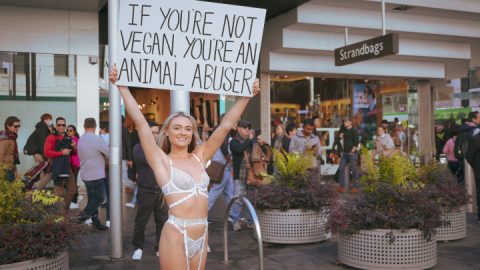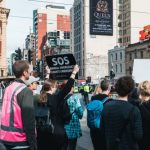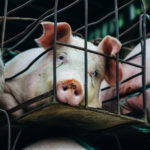A Misuse of the Law to Silence Me: Vegan Activist Tash Peterson on Liquor Premises Ban
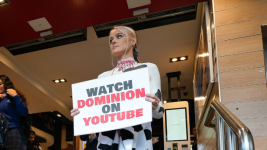
The disruptive protests of animal rights activist Tash Peterson have caused such a stir in her home state of Western Australia over the last three years, that WA police recently banned her from all licensed premises, issuing a barring notice under local liquor control laws.
Peterson’s demonstrations are aimed at raising awareness to what she calls the “animal holocaust”, which sees the wholesale torture and slaughter of 4.9 billion land and seas animals annually in this country alone, as a result of factory farms, slaughterhouses and the marine industry.
Stirring up controversy grabs attention, and Tash is well versed in this. And while her protests are nonviolent, they often convey the brutality farmed animals are subjected to via the use of props, or otherwise her demonstrations employ partial nudity to get the message across.
On receiving what is her third barring notice from the WA police commissioner, under circumstances that legal experts maintain is a misapplication of the law, Peterson has recently taken her campaign to Melbourne, where her actions continue to confront but don’t recieve such a draconian response.
Silencing rising voices
Whilst Peterson’s case involves WA authorities concocting a way to silence her vegan protest under pre-existing laws, over the last decade, federal and state governments have been enacting legislation containing ag-gag laws, which are specifically designed to silence animal rights activists.
Former PM Scott Morrison vowed to crack down on “green collar criminals” in April 2019, following a series of nationwide vegan disruptions. And by September that year, his government had passed ag-gag laws that criminalised those who share the details of particular animal agribusinesses online.
While in this state, the Right to Farm Act 2019 Act (NSW) passed two months later. This saw penalties attached to the controversial offence of aggravated trespass, which involved fines quadrupled specifically for actions on agricultural land, as well as the imposition of a 3 year prison term.
And in another instance of laws misapplied, Farm Transparency Project director Chris Delforce has a case before the High Court, in which he’s challenging the use of NSW surveillance laws in response to animal rights actions, as he claims it impinges on the implied freedom of political communication.
Hard to take truths
During her demonstrations, Peterson calls on passers-by to watch the internationally acclaimed Dominion, a 2018 documentary directed by Delforce, which shines a light on the inner workings of Australian slaughterhouses and farms to such a degree that many give up meat after viewing it.
For her efforts in trying to turn WA residents on to veganism, Peterson has not only received barring notices, but she’s been convicted on two counts of disorderly conduct and one of trespass. She’s currently facing a fresh charge of each. Her life has been threatened and she’s been assaulted.
Sydney Criminal Lawyers spoke to Tash Peterson about why she keeps up her campaign in the face of such adversity, the fact that animal agriculture is one of the leading causes of the climate crisis, and what the endgame is for the animal liberation movement.
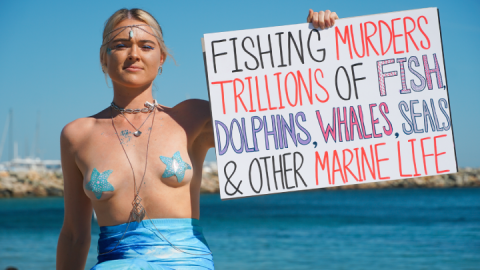
The WA government recently banned you from all licenced venues in the state, including nightclubs, pubs and restaurants, as a result of your confronting vegan protests. This is the third barring notice you’ve received.
Tash, what are your thoughts on the new barring notice? And how is the government able to stop you from entering establishments serving alcohol simply due your nonviolent protest actions?
It’s a misuse of the law in an attempt to silence me as an activist. The notice is clearly designed to bar violent and abusive people from licensed premises, however I’m always nonviolent when I do my protest.
My intention, in fact, is to stop violence inflicted upon others of different species, not to create violence.
So, they’ve used this barring notice in section 155AA of the Liquor Control Act 1988 (WA), as a way to prevent me from entering some supermarkets, most restaurants that have a liquor licence, and other licensed venues to prevent me from being able to exercise my right to protest.
As you know, this is the third time I’ve been issued with a barring notice since March 2020 as a result of my protests.
This is what is stated in the current notice:
“I believe on reasonable grounds that Natasha Peterson contravened a provision of written law on a licensed premises.
The commissioner of police hereby gives notice that Natasha Peterson is barred from entering specified licensed premises within Western Australia.”
The further reasons provided as to why they were able to serve me this barring notice were that I refused to leave a venue and because I was acting in a disorderly manner.
What did the protests involve?
I dressed as a slaughterhouse worker in a white costume and white boots, and I had fake blood across my body. I also held a speaker playing the sound of animals screaming for their lives inside slaughterhouses.
I was just speaking up about what non-human animals are subjected to, that being they’re brutally murdered. I was just providing an animal rights message as I walked through the restaurant.
That was in Outback Jacks. After I was kicked out, I noticed it was quite busy across the road at Old Shanghai, so I continued to do my protest in the same manner through that food court.

You’ve been convicted of two disorderly conduct offences and one count of trespass in relation to your activism. You’ve now got this ban hanging over your head, you’ve received death threats in relation to your protests and you’ve even been assaulted.
So, why do you consider it necessary to undertake your demonstrations in the face of all of these negative reactions?
It’s essential to continue participating in civil disobedience and disruptive activism for animal rights.
It’s the most effective way to create social change because it generates so much media attention and therefore, public dialogue on the issues at hand.
My message is incredibly important because I’m raising awareness to the largest injustice and holocaust in history.
Each year, three trillion individuals are brutally murdered in the meat, dairy, egg, wool, leather and fur industries, and other industries that are abusing animals essentially for food, fashion, entertainment, racing and testing.
I need to continue pursuing my activism regardless of what resistance I’m facing from the public and the law.
As you’ve mentioned, the application of the ban is controversial because it would seem a law is being used in a manner it was not drafted for. However, you’ve now moved to Melbourne since being subjected to it.
But there are laws specifically designed to counter animal rights protest in this country, which are commonly known as ag-gag laws. The legislating of these laws has been on the increase over the last decade.
How do these laws work? And do you expect, under the differing systems, you’ll be able to continue your campaigning more freely in Melbourne, than you could in Perth?
Ag-gag laws are specifically designed to deter and prevent animal rights activists from entering places of animal slavery and abuse – the meat, egg and dairy industries – to deter them from exposing the atrocities that are occurring inside these industries.
These laws further stop activists from showing the public the abhorrent cruelty that non-human animals are subjected to and what the industries don’t want the public to know.
These laws work by increasing penalties associated with trespassing onto animal agricultural facilities.
Victorian laws aren’t as draconian as Western Australian laws, which will allow me to have a lot more freedom to protest, and I probably wouldn’t have received as many convictions or the barring notice if I was in Victoria.
One benefit of the harsh laws in Western Australia is the more convictions and barring notices I receive, the more attention is given to my message.
It actually generates more dialogue and media attention, when I do receive these barring notices and have to go to court.
Your nonviolent protest has garnered some quite disgruntled responses from the public, which have involved both abusive words and physical assaults.
Why does vegan or animal rights protesting seem to provoke such a heated response from the public, whereas other causes don’t seem to do this to the same extent?
The animal rights movement is still in its early stages. Therefore, it’s not accepted by the public and, in a sense, it is a taboo topic as most of our society still engages in animal abuse every day.
People will often react in an emotionally defensive manner when confronted with a message about veganism or animal rights because they don’t want to be associated with contributing to animal abuse and murder.
People are so disconnected from the murdered bodies on their plates, or the leather jackets that they wear, that they don’t even believe they’re contributing to animal abuse.
Therefore, they become very defensive, and even verbally and physically aggressive, when animal rights activists speak up about the atrocities that non-vegans are essentially participating in.
Other causes once too received similar reactions from the public in their early stages of change.
If we look back into history, during the times of the suffragettes and the civil rights activists, they all received massive backlash and resistance from the public and they were often prosecuted and even gaoled for their actions.
The only reason that they are more accepted today is because of those activists participating in civil disobedience. It has just become more socially accepted today because of the massive change that those activists created.
Over the last weekend, you got out on the Melbourne streets to raise attention to the impact that animal agriculture is having on the climate crisis. Often the major contribution that animal farming is having on this issue is suppressed.
What sort of impact is the mass farming of animals having on the climate crisis? And why is the movement often silent on this aspect of it?
Animal agriculture is a major contributor to climate change, and in fact, it produces more greenhouse gases than the world’s entire transport system.
It is the leading cause of deforestation, species extinction, habitat loss, water and air pollution and ocean dead zones.
Seventy billion land animals are bred into existence every year. So, the amount of land crops, water and other resources that this consumes is astronomical.
Not to mention the fact that 2.7 trillion marine animals are ripped from the ocean annually, which has seen devastation to marine ecosystems.
A majority of the public are simply unaware of the devastation that animal agriculture is inflicting upon farmed animals, wild animals and the climate. This includes climate activists, as they’re just simply unaware.
For those who are aware and aren’t vegan, I believe they’re simply being selfish, and they would rather point the finger at the government for not implementing changes, rather than changing their own personal lifestyle.
Living vegan is the single biggest action one can take to save lives and to decrease their carbon footprint.
And lastly, Tash, you’ve not alone in campaigning for veganism. The movement calling on the broader public to switch to a plant-based diet has grown significantly over the past decade, and so too, has the number of vegans in the community.
So, from your perspective and that of fellow activists, where is the vegan movement heading? And ultimately, what sort of societywide changes does it want to see?
Over recent years, I’ve seen significant changes in the animal rights movement. It is certainly growing, and veganism is increasing worldwide, thanks to the work of animal rights activists.
We want to see a future where non-human animals are no longer enslaved, subjected to rape, abuse, murder and torture, which is what’s happening in the meat, dairy and egg industries, and other industries that are abusing animals for clothing, entertainment and testing.
We want to see all animal industries abolished. And we want to see non-human animals having equal rights to live freely from abuse and exploitation just like humans do.
